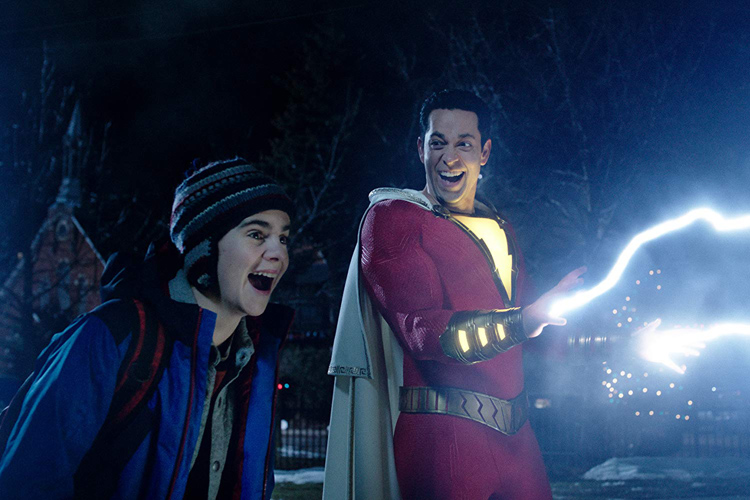I’m convinced that the DC Extended Universe has given moviegoers Stockholm syndrome. The appeal of the Marvel Cinematic Universe at least makes sense: its movies are, more often than not, competently made, even if they’re perennially incomplete. The DCEU, on the other hand, has long peddled mediocrity—but even after its worst movies, fans keep coming back in the hopes that the franchise will finally treat them right. Only Wonder Woman has fulfilled that hope. But hey, the gleeful silliness of Shazam! looks promising: is it good enough to keep us trapped in DC’s cycle of abuse?
Now that DC has given up on the dour tone that pervaded Man of Steel and Batman v Superman, they’re shifting things in a more lighthearted direction, as signaled by the sheer ludicrousness of Aquaman. Shazam! pushes that dial even further. This is the DCEU’s first outright comedy, which is understandable given the nature of the protagonist: Shazam is a 14-year-old kid named Billy Batson who can transform into an adult superhero by shouting his magical name, which was given to him by an ancient wizard who saw the purity of Billy’s heart. Serious this is not.
The plot sounds like fan fiction written by a kid with a Superman lunchbox, but Shazam! knows that, and leans hard into the goofiness. The movie’s upbeat tone recalls some of Spielberg’s family-friendly efforts: even when the stakes are life or death, it’s constantly looking to put a smile on your face. Unfortunately, due to a shoddy screenplay, that’ll result in a grimace half the time.
Have you ever been part of a group conversation with someone who was trying really hard to be the funny friend? You can see them formulating jokes in their head for minutes, only to force them onto the conversation when the topic has already passed—usually to uncomfortable silence. That’s how most of the comedy in Shazam! goes over. It’s painfully obvious that the screenwriter is a grown man trying to emulate how children joke. It doesn’t help that the child actors have no sense of comedic timing or delivery.
Thankfully, that’s where Zachary Levi saves the day. Levi plays the adult persona that Billy inhabits for much of the film, and his superpower is making terribly written comedy sound like natural, charming improvisation. Levi’s childlike mannerisms and animated performance are delightful to watch, and whenever he’s on screen, it’s hard not to have a good time.
The movie’s other major strength is the opposite of what you’d expect. Director David F. Sandberg doesn’t have a comic book movie background—he rose to prominence with his terrifying horror films Lights Out and Annabelle: Creation. Sandberg brings his horror touch to Shazam!, especially when it comes to the movie’s villains, the Seven Deadly Sins. The creature design of the Sins is marvelously gruesome, though it’s sure to frighten younger audience members.
At least they’ll feel right at home with the movie’s message, which is quite profound if you’re ten years old. At its heart, Shazam! is about the importance of family, which should be a beautiful sentiment—but the movie goes the Fast and Furious route of shoving the word “family” into every possible line of dialogue, rendering it almost meaningless. Shazam! doesn’t wear its heart on its sleeve so much as it shoves it down your throat.
The last fifteen minutes of the movie, however, figures out how to combine family and superheroism in a more effective way. The movie’s finale is sweet, entertaining, and ingenious considering what the filmmakers had to work with. It makes you wonder where that creative spark was for the first two hours.
Oddly enough, the greatness of the final minutes is what worries me. Moviegoers will leave the theater with a good taste in their mouth, despite having sat through a mostly mediocre movie. The DCEU has still only produced one winner after seven tries—can we break the cycle of hoping that the next superhero movie will make good on the fleeting promises of the last?
★★½ (2.5/5)




